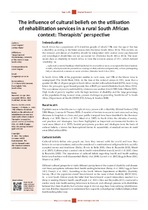The influence of cultural beliefs on the utilisation of rehabilitation services in a rural South African context: therapists’ perspective
Abstract
South Africa has a population of 51.8 million people of which 7.5% over the age of five has a disability according to the latest census data (Statistics South Africa 2014). This statistic on the national prevalence of disability should be interpreted with caution since psychosocial and neurological disabilities are not accounted for (Statistics South Africa 2014). The most recent data on disability in South Africa is from the national census of 2011, which defined ‘disability’ as: ... a physical or mental handicap which has lasted for six months or more, or is expected to last at least six months, which prevents the person from carrying out daily activities independently, or from participating fully in educational, economic or social activities. (Statistics South Africa 2014). In South Africa 38% of the population resides in rural areas, and 25% of the labour force is unemployed (The World Bank 2014). At the time of the national census in 2011, more than a quarter (26.3%) of all poor people in South Africa resided in KwaZulu-Natal (KZN), most living below the per capita upper-bound poverty line of R620 per month (Statistics South Africa 2014). The co-existence of poverty and disability reinforces one another (Grech 2009; Sala-i-Martin 2005). High levels of poverty together with the high incidence of disability and the large percentage of the population living in rural areas, present challenges to providing ‘health for all’ in South Africa (Department of Health [DOH] 2010; Schaay & Sanders 2008).

